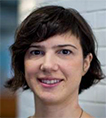(https://doi.org/10.55612/s-5002-061)

Matt Adcock
is the Director of the Data61 Immersive Environments Lab and a Principal Experimental Scientist in Data61’s Imaging and Computer Vision Group. He uses Computational Imaging, Interactive Computer Graphics, and User Experience Innovation to build systems that enable new connections between the digital and physical worlds to drive industrial productivity and safety. Dr Adcock has published over 100 peer reviewed research papers and holds degrees from the Australian National University (ANU), the University of South Australia (UniSA) and the Massachusetts Institute of Technology (MIT).

Glenda Amayo Caldwell
is a Professor and the Academic Lead Research in the School of Architecture & Built Environment, Faculty of Engineering at the Queensland University of Technology. She is an expert in physical, digital, and robotic fabrication, leading Industry 4.0 innovation through human-centred research in design robotics, media architecture, and human-building interaction.

Saminda Balasuriya
is a Postdoctoral Research Fellow at the QUT Centre for Robotics. His research focuses on human-robot interaction and human-computer interaction, with a broader interest in designing inclusive technologies that can support diverse groups of people. His current research investigates how social robots can support people with disabilities in contexts such as at work and disability day centres.

Elin A. Björling
Ph.D., is a senior research scientist and lecturer in the Department of Human-Centered Design & Engineering. She is the co-founder of the Momentary Experience Lab, conducting design and development projects that capture data and intervene to improve health in the real world. She is the Project Lead for Project EMAR, an interdisciplinary project exploring the design and development of a social robot to measure and reduce stress in teens. Using human-centered design, she engages in outreach education and research, working directly with teens in the local community, including co-creating the high school Design Challenge. Over the past two decades, She has been an integral part of numerous research projects in health sciences and education that focus on teen stress. As a research methodology, she is focused on ecological momentary assessment — capturing momentary data as it happens in the wild. She holds a Clinical Faculty position in the School of Nursing and Healthcare Leadership at the University of Washington and consults locally with organizations interested in improving teen health. She is a trained program evaluator with experience in educational program evaluation. She has designed and implemented evaluation plans for several large educational grants, both state and federally-funded.

Alan Burden
is a Postdoctoral Research Fellow at the Australian Cobotics Centre. His research focuses on designing socio-technical systems for human-robot collaboration and interaction, emphasizing user-centred design, user experience, and extended reality (XR) technologies. Alan completed his PhD in Design Robotics at QUT and has a diverse professional background in architecture, UX, photogrammetry, digital fabrication, and biomedical science. He is dedicated to leveraging XR technologies to enhance human-machine interactions, aiming to improve work conditions, production efficiency, and workforce acceptance.

Marc Carmichael
is a Senior Lecturer and an experienced robotics researcher and developer who is passionate about the realisation of robotic technology that aids humans in performing tasks. He has a particular interest in robotic systems that provide physical assistance to users during laborious activities, enabling humans and robots to collaborate on physical tasks to meet the emerging needs of industry and society. He has led the development of several novel robotic systems to address real-world problems in a variety of industries and domains. Marc is a core member of the UTS Robotics Institute (UTS:RI), where he is the Director of Teaching and Student Engagement. He leads the UTS:RI human-robot interaction (HRI) lab, and champions many UTS-based initiatives to educate students and industry on the use of robotics. His educational outputs include several undergraduate engineering subjects, as well as industry-facing micro-credentials. His projects include collaborations with businesses and partners including: NOKIA, OMRON, NSW Centre for Work Health and Safety, Rookwood General Cemetery, and more. He is currently an academic member of the Australian Cobotics Centre with the aim of increasing the utilisation of collaborative robotics by Australian businesses. Marc received his B.Eng. in Mechanical and Mechatronic Engineering (2008) and PhD degree (2013) in the area of robotics from the University of Technology Sydney. He joined the UTS Centre for Autonomous Systems (UTS:CAS) as a Lecturer in 2016. In 2018 he was named as one of Australia’s most innovative engineers by Engineers Australia (EA).

Jared Donovan
is an Associate Professor in Interaction Design in the School of Design at the Creative Industries Faculty, Queensland University of Technology. His main research interests are in the areas of Gestural and Embodied Interaction, Participatory Design, Design Robotics and Performance Robotics. The main aim of his research is to find better ways for people to be able to interact with new interactive technologies. He is also interested in finding better ways to involve people in the design process, such as by employing ‘provotypes’ (provocative prototypes) to spark discussion and debate.

Belinda J Dunstan
is an academic in the UNSW Faculty of Arts, Design and Architecture. She is the Principal Lead for the UNSW Creative Robotics Lab, studying social robot morphology, technology ethics, cultural robotics and critical futuring. Dunstan is the lead editor of Cultural Robotics: Social Robots and their Emergent Cultural Ecologies (Springer 2023), and she recently launched Australia’s first undergraduate minor in Social Robotics, at the University of New South Wales.

Anthony Franze
is a post-doctoral fellow at Queensland University of Technology (QUT). His research focus is motivated by knowledge gaps in the current literature surrounding the use of Extended Reality (XR) technologies in the design, fabrication, and assembly of customised projects. He is currently a XR developed specialist and industrial design lead at Advanced Robotics for Manufacturing Hub (ARMHub). Anthony has led numerous advanced manufacturing projects in Australia and abroad. This includes collaborating with Milford Industries, Icarus, EGR Group & UAP. He also provides consulting services to the broader industry through Anthony Franze` Studio.

Shuyue Gu
is a Master’s student at the University of Washington in the Department of Human-Centered Design & Engineering. She holds a Bachelor’s degree in Economics. Her research interests focus on the intersection of education and technology, with a particular emphasis on gamification. She is passionate about designing engaging and nurturing learning experiences, especially for children.

Matthias Guertler
is a Senior Lecturer and founding member of the Centre for Advanced Manufacturing at the University of Technology Sydney. He holds a German engineering PhD in Engineering Systems Design (Dr.-Ing.) from the Technical University of Munich, Germany, along with two Master degrees in mechanical engineering and in management. His applied research in Engineering Systems Design focuses on developing and applying new processes, methods and tools that help organisations in building an in-depth understanding of specific issues/problems, developing alternative solutions, and assessing and selecting the most suitable ones. While this usually means the product development of technical systems, it can also include overarching issues like technology adoption and force design. His research focuses on advanced Systems Engineering, including AI-enhanced Systems Engineering and hybrid-agile Systems Engineering, and systematic advanced manufacturing technology adoption in SMEs. Current examples include the development (a) of new guidelines to design safe cobot workplaces, (b) of frameworks to plan and manage open innovation networks, and (c) the development of adoption framework of new advanced and digital manufacturing capabilities, such as collaborative robotics, additive manufacturing and digital twins – also considering necessary socio-technical enablers like organisational and individual competences and training. Through his longstanding work in and with German and Australian manufacturing companies and the Australian Defence Force, he built a deep understanding of the socio-technical opportunities and challenges of advanced manufacturing and Industry 4.0. Through his applied research projects, he supports organisations in understanding and solving pressing complex socio-technical problems. His work particularly focuses on the interface and dependencies between product development and advanced manufacturing, and the transfer of research results to practice.

Georgina Guillen-Hanson
a postdoctoral researcher at the prestigious Gamification Group at Tampere University, Finland, holds a PhD in games and gamification, a master’s degree in marketing and business direction, an MSc in Strategic Leadership towards Sustainability, and a bachelor’s in political science and economics. Having more than 20 years of experience in the field of sustainability and working with the public, private and not-for-profit sectors in over 40 countries, she now combines her practical expertise with research to advance the sustainable living agenda. Her research centers around the realms of sustainability transitions, participatory backcasting, sustainable consumption and consumer engagement (Photograph by Henning Ebel).

Mati Heidmets
is an Estonian psychologist and educational scientist. His contributions to the fields of psychology and education have been substantial and multifaceted. Throughout his career, Mati Heidmets has held various administrative roles within the academic community. Notably, from 2001 to 2006, he served as the Rector of Tallinn Pedagogical University, which later merged into Tallinn University. During this period, he played a pivotal role in shaping the institution’s educational landscape. As a scholar, Mati’s research interests span diverse areas. These include environmental psychology, where he explores the intricate relationship between individuals and their surroundings. Additionally, he delves into the dynamics of minorities in society, shedding light on their experiences and challenges. His work also extends to educational sociology, examining the social structures and processes within educational institutions. His recent endeavors include investigation of the nonverbal behavior of social robot users and its impact on creating a sense of presence in the learning environment. His findings contribute to our understanding of how technology influences human interactions and learning outcomes.

Guy Hoffman
is an Associate Professor and the Mills Family Faculty Fellow in the Sibley School of Mechanical and Aerospace Engineering at Cornell University. Prior to that he was an Assistant Professor at IDC Herzliya and co-director of the IDC Media Innovation Lab. Hoffman heads the Human-Robot Collaboration and Companionship (HRC²) group, studying the algorithms, interaction patterns, and designs enabling the co-existence of people and robots in the workplace and at home. Among others, Hoffman developed the world’s first human-robot joint theater performance, and the first real-time improvising human-robot Jazz duet. His research papers won several top academic awards, including Best Paper awards in 2004, 2006, 2008, 2010, 2013, 2015, 2018, 2019, 2020, and 2021. In both 2010 and 2012, he was selected as one of Israel’s most promising researchers under forty. His TEDx talk is one of the most viewed online talks on robotics, watched more than 3 million times. Hoffman holds a Ph.D from MIT in the field of human-robot interaction and an M.Sc. in Computer Science from Tel Aviv University as part of the Adi Lautman interdisciplinary excellence scholarship program.

Janika Leoste
a PhD in Educational Sciences and a M.Sc. in Economics and Finance, is an Associate Professor of Educational Robotics at Tallinn University and an Assistant Professor of IT Didactics at Tallinn University of Technology. Her research focuses on educational robotics, STEAM education, educational innovation, hybrid and blended learning. She has published 60 scholarly articles, including in Frontiers or Francis & Taylor. Since 2019 she is teaching at university, including robot-integrated learning and project based learning projects. She has supervised 12 MA students and has 4 PhD students under supervision. Janika’s previous experience includes developing accounting software and web-based games, producing cartoons and teaching robotics. Janika has successfully applied for research funding from many national and international sources, including the EU’s Horizon Europe – for example, one of her projects is an ERA Talents project EdTech Talents.

Wei Win Loy
is a PhD candidate at Queensland University of Technology (QUT), where his research centers on the use of augmented reality (AR) head-mounted displays (HMDs) to enhance human-robot collaboration (HRC) in the realm of creative architectural design exploration. His work particularly focuses on collaborative assembly tasks, aiming to discover novel methods for improving interactions and communication between architectural designers and collaborative robotic arms. By leveraging AR technology, Loy seeks to create more intuitive and effective interfaces that facilitate seamless collaboration, ultimately contributing to advancements in both architectural design and robotics.

Kristel Marmor
is currently working as a head of studies at IT College of Tallinn University of Technology. Her research interests lie in the field of social sciences, specifically organizational behavior studies. Throughout her career, she has been involved in various administrative roles, including working as a head of studies at Tallinn University and as an administrative director at Tallinn University’s Institute of Social Sciences. Additionally, Kristel has contributed to research in the area of the nonverbal behavior of social robot users in creating a sense of presence in the learning environment during her doctoral studies at Tallinn University of Technology.

Alicia Mitchell
is a PhD candidate specializing in human-robot interaction (HRI) at Queensland University of Technology. Her current research focuses on designing social robot applications to support people with intellectual disabilities in work environments. She is using co-design and participatory design approaches, collaborating closely with partner disability support organizations and participants in real-world environments.

Gavin Paul
graduated with a Bachelor of Engineering in Computer Systems Engineering at UTS. In 2010, he received his PhD in Engineering (Robotics) at UTS. He is currently an Associate Professor at the UTS Robotics Institute.

Markus Rittenbruch
is a Professor in Interaction Design at the School of Design and the Associate Director of the QUT Design Lab at QUT’s Creative Industries Faculty. He has over 25 years of research experience in the fields of Interaction Design, User Experience Design, Human-Computer Interaction (HCI), Computer Supported Cooperative Work (CSCW) and Ubiquitous Computing (UbiComp). Markus’ research particularly focusses on the design and evaluation of large-scale collaborative systems, collaborative visualization systems, human-robot collaboration, ambient, ubiquitous and physical computing, natural user interfaces, large-screen multi-touch interfaces and innovative ways of interfacing with and visualizing sensors and sensor data.

Cryston Sahae
is currently pursuing a Master’s degree in Human-Computer Design and Engineering at the University of Washington. With a robust background in business, data science, and psychological research, she is dedicated to exploring the intersection of robotics and medicine. This interdisciplinary expertise drives her work on innovative solutions that enhance user experience in sensitive contexts. After graduation, she aims to leverage this unique skill set as a product manager, focusing on developing cutting-edge technologies.

Nathalie Sick
is a Senior Lecturer in Contemporary Technology Management and a core member of the Centre for Advanced Manufacturing in the Faculty of Engineering and IT at the University of Technology, Sydney. Her research interests are heterogeneous collaborations, industry convergence and technology forecasting in technology-driven environments. Nathalie is particularly interested in spanning the boundaries between different disciplines, industries and actors in the collaboration arena, such as industry, university and government.

Laurianne Sitbon
is Associate Professor in the school of Computer Science, a chief investigator in the QUT Centre for Robotics and in the QUT Centre for Justice. She leads research in human computer interactions, inclusive social robotics, information access and human-AI teaming. She has developed inclusive co-design methodologies for innovation in emerging technologies.

Nichelle Song
is pursuing a Master’s degree in Human-Centered Design and Engineering at the University of Washington. For the last seven years, she has designed experience in diverse industries, such as healthcare, IT, communications, and career growth. Upon graduation, she will continue to design tools to help internal Amazon employees grow their careers.

Muge Belek Fialho Teixeira
is an Associate Professor at Queensland University of Technology (QUT), School of Architecture and Built Environment and founder of [f]-FLAT. Her main research interests are in the areas of Transdisciplinary Design Research, Phenomenology of Perception, Multimodal Spaces and Computational Design Strategies. She is interested in creating an understanding of our world out of our natural attitude through sensory experiences of space that are created using computational and digital strategies. She constantly looks for ways to expand the body of knowledge through transdisciplinary studies/thinking in design through making.

Mattia Thibault
is a Professor in Translation in the Creative Industries at Tampere University and has a PhD in Semiotics and Media (Turin University). His research interests include semiotics and translation, extended realities, speculative research, and playfulness in the built environment (real and digital). He is the leader of the InterReality Research Group which focuses on the relations between different “virtual” spaces (digital or possible) and their connections with the “real” world. He is PI of the projects InterReal (ERC-StG), NEXR (Business Finland Co-Research) and Mobility Mindshift (funded by Net Zero Cities, EU).

Laura Tomidei
is a Research Assistant and PhD Candidate at the Centre for Advanced Manufacturing in the Faculty of Engineering and IT at the University of Technology, Sydney. Her current research focuses on Industry 4.0 and Industrial Data Science, with her PhD aiming to develop a data science-based method to automatically identify the key value streams based on production data. Laura’s research spans on the ability of new technologies to transform processes in various Industries and generate value. Laura has successfully contributed to research projects with industry, Defence and Government partners at UTS since 2018. Recent industry projects that she contributed to include the WHS NSW Guidelines for Safe Collaborative Robot Design and Implementation, and a scoping study focused on additive manufacturing opportunities for Australian agribusiness for Agrifutures. Laura Tomidei holds a B.Sc. and a M.Sc. in Engineering Management from the University of Bologna, and a M.Sc. of Commerce with specialisations in Business Analytics and Business Information Systems from the University of Sydney.

Jasper Vermeulen
is a PhD Candidate in the School of Architecture & Built Environment, Faculty of Engineering at the Queensland University of Technology. He specialises in Human Factors studies within the domain of Human-Robot Collaboration. His research aims to advance the understanding of optimal experiences between humans and collaborative robots as they work closely together on the same tasks.

Lige Yang
is a master’s student in Human-Centered Design and Engineering at the University of Washington, focusing on human-computer interaction, robotics, strategy design, and inclusive design. With over three years of experience in the user experience field, she is dedicated to bridging the gap between design and technology. Her pursuit of creating accessible and innovative technology solutions for marginalized communities will continue after graduation.
